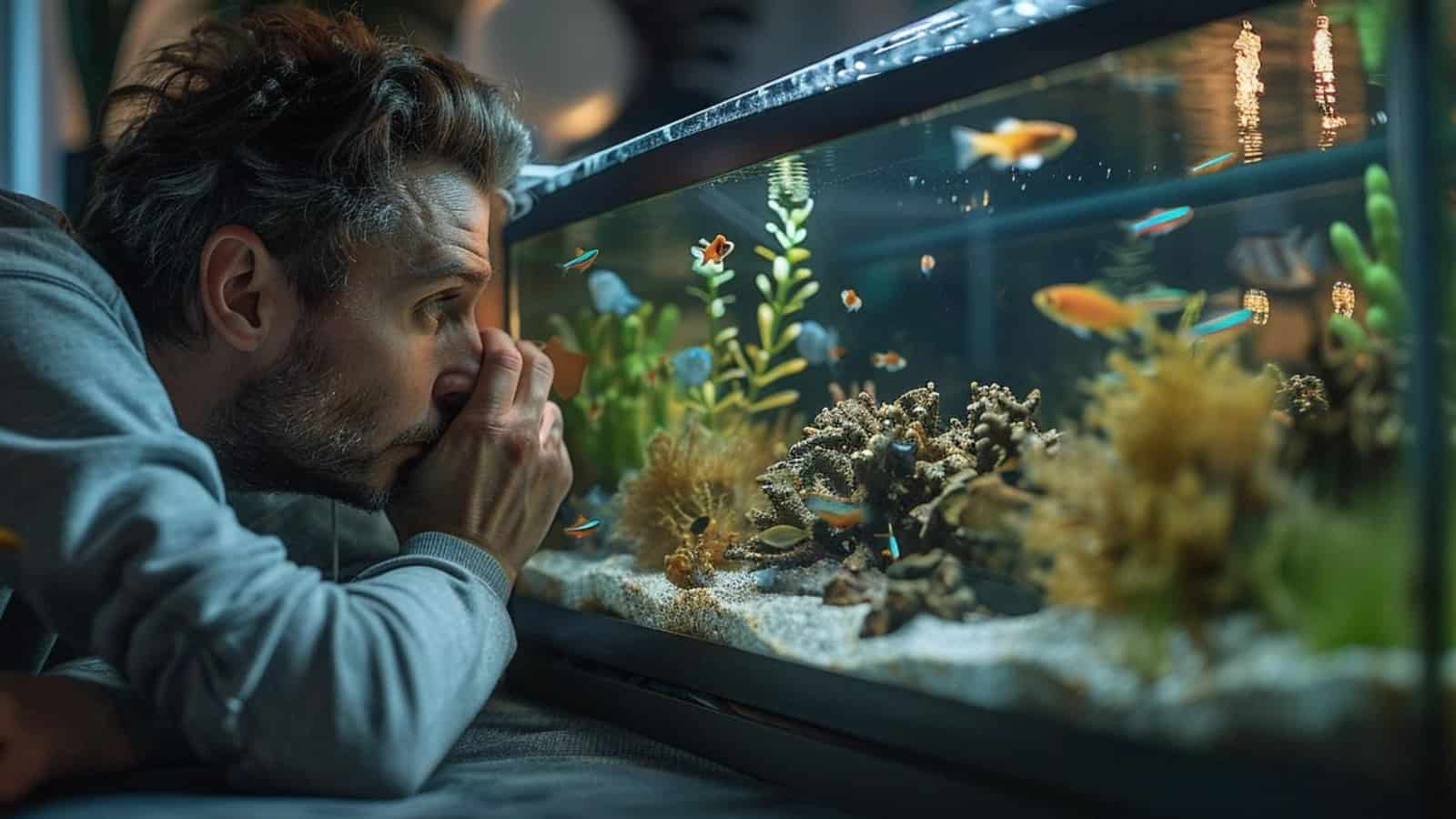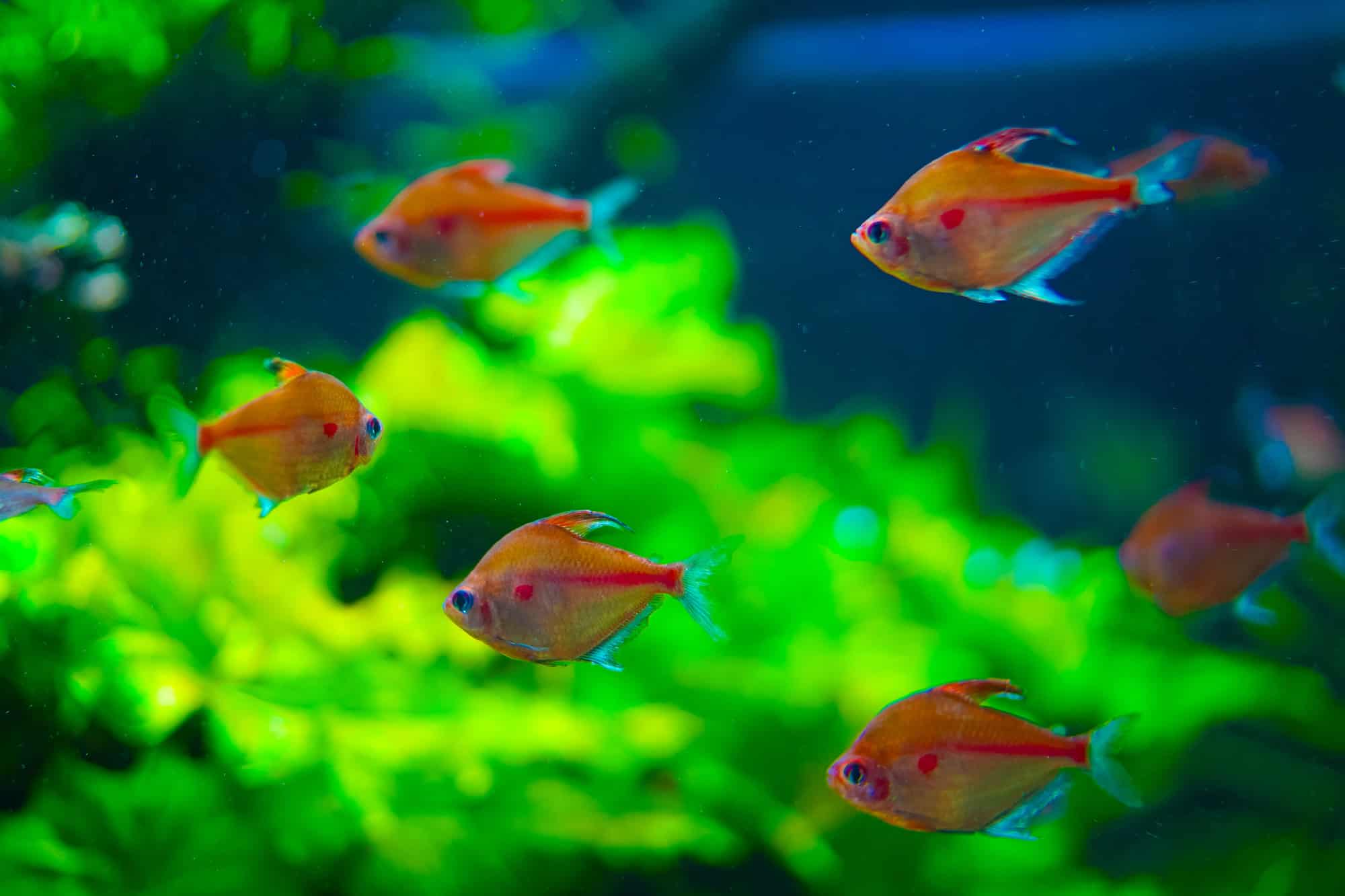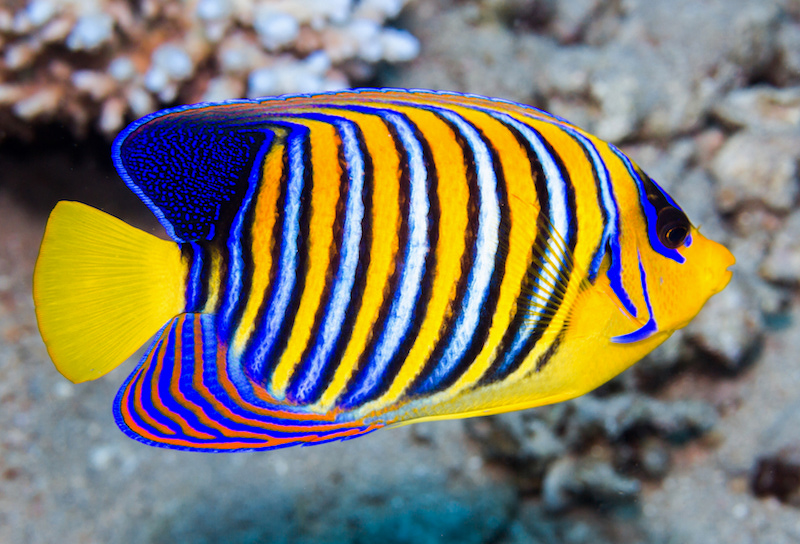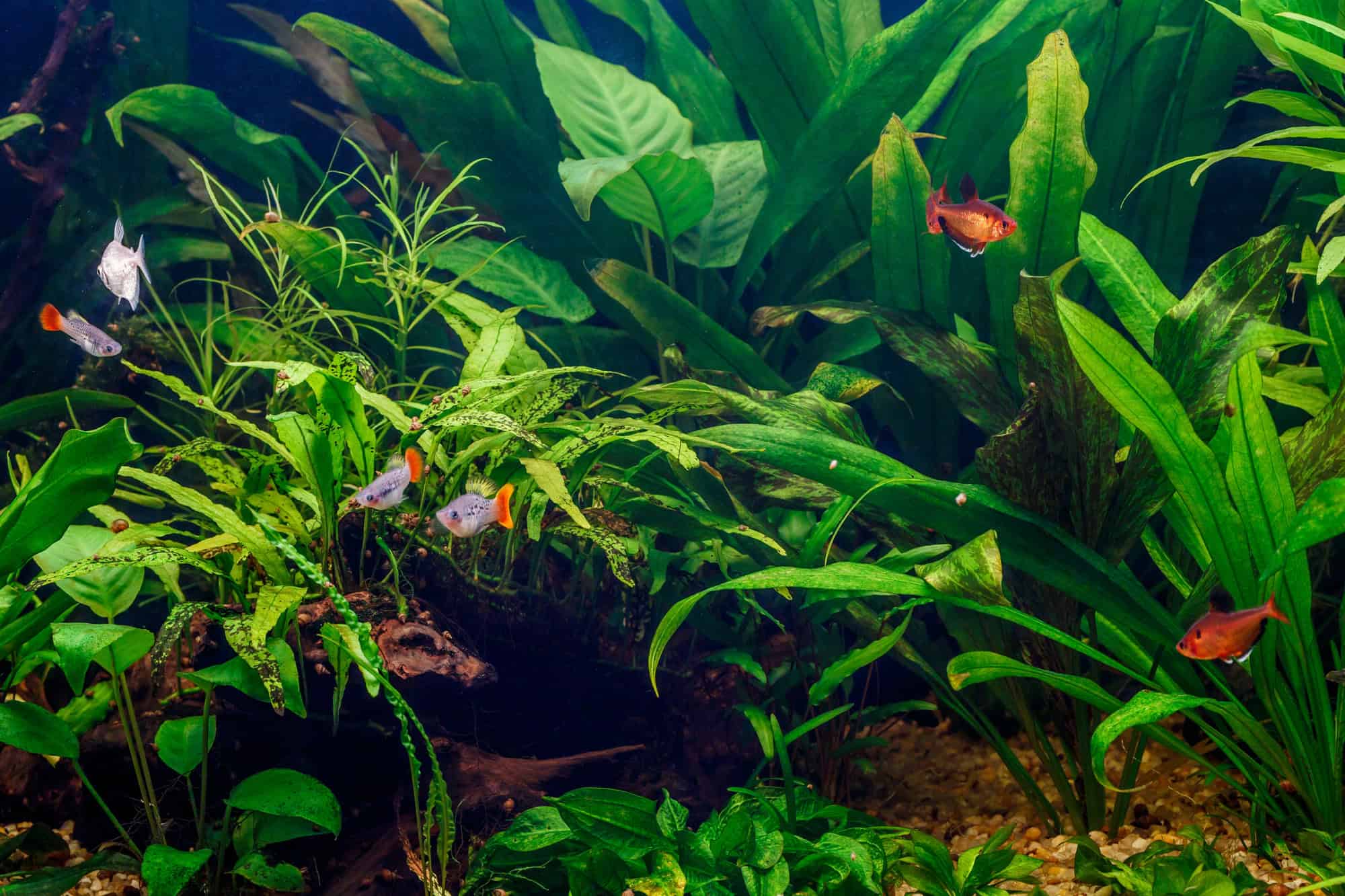Owning an aquarium is a fun hobby that’s popular worldwide. Picture the scene; you’ve spent many hours and a lot of cash on designing the perfect aquascape and providing the perfect habitat for your pets.
But what’s that horrendous smell coming from your fish tank?
That can’t be happening! You maintain your tank correctly, and it’s full of fresh plants that are supposed to help purify the water. So, why does it stink so bad?
If your aquarium smells bad, that means there’s a serious problem somewhere that needs your immediate attention. Keep reading to find out why your fish tank is still malodorous even after you cleaned it, and learn what you can do to fix the pong.
Key Takeaways
- Unpleasant odors in an aquarium can be caused by dead fish hidden in the tank, surplus food decomposing on the substrate, or a decline in plant health.
- Overstocking an aquarium leads to excessive waste that overburdens the filtration system, contributing to the development of foul odors.
- To ensure an odor-free aquarium, perform regular water changes, maintain a proper feeding regimen, and provide attentive care to both the filter system and live aquarium plants.
Summary Table
The following table summarizes what we’ve revealed in this article. Before diving into the main event, check out this table to find out what could be causing bad smells from your fish tank even after cleaning it and how to fix the problem.
| Causes of Odor | Solution | Prevention |
|---|---|---|
| Dead Fish/Critters | Search thoroughly and remove the deceased. Carry out a partial water change. | Daily fish counts and regular observation of fish behavior. |
| Overfeeding | Remove uneaten food with an aquarium vacuum. Feed fish only as much as they can eat in a few minutes. | Feed fish twice daily with controlled portions and include one fasting day per week. |
| Overstocking | Rehome excess fish to provide adequate space and resources for remaining fish. | Research fish species to determine adult size and tank requirements prior to purchase. |
| Decomposing Plant Matter | Remove dead or dying plants immediately. Perform regular maintenance on living plants. | Trim and thin plants regularly. Remove dead leaves promptly from the substrate. |
| Dirty Filters | Clean filter media in tank water to prevent clogging, and replace as per manufacturer’s guidelines. | Filter media should be cleaned and replaced every couple of weeks. Consider adding activated carbon to the filtration system. |
| Poor Water Quality | Perform a 20-30{a47be734f0df8d7f120a7df290cf380c79376e8356d1aab405383bb23aa6ce67} water change with dechlorinated water. Clean tank glass and vacuum substrate. | Weekly partial water changes and substrate vacuuming. Maintain algae control and adequate filtration. |
Remember that a stinky fish tank is usually a sign that something is wrong. Addressing the issue promptly and effectively eradicates the odor and ensures a healthy and thriving environment for your aquatic pets.
Common Causes of Fish Tank Odors
In a well-maintained fish tank, you might notice a slight, earthy aroma when you lift the lid to feed your fish. That’s perfectly normal and not a cause for concern.
However, if your fish tank develops an overpowering odor, you need to investigate, discover the cause, and fix it.
Here are some of the most common causes of stinky fish tanks.
Dead Critters
The most common cause of a seriously malodorous fish tank is a dead fish or some other critter that’s died.
Unfortunately, it can be quite a while before you notice one of your fish, shrimp, or snails has gone missing.
I can tell you from personal experience that small fish and tiny shrimp are very accomplished at hiding away, sneaking into tiny spaces, and remaining there hidden. If the critter then dies, you might not even realize something’s wrong until you notice the smell. I’ve also found a tiny dead shrimp stuck in my filter unit; now, that really did stink!
When any creature passes away, its body immediately begins to decompose, leeching oils and proteins into the water. Those substances find their way to the water’s surface and evaporate as gas, which is what causes the smell. The smell should quickly disappear once you’ve located the deceased fish and removed it from the tank.
Once you’ve removed the dead creature from your aquarium, I recommend a partial water change to freshen the water and make the environment safe for your fish.
All Present and Correct!
Try to make it a habit to carry out a daily livestock headcount. That can tell you immediately if anyone is missing before the dead body starts rotting in the tank and polluting the water.
Of course, that’s not easy if you have a large tank with lots of small fish and invertebrates living in it, but it’s well worth the time and effort.
Overfeeding
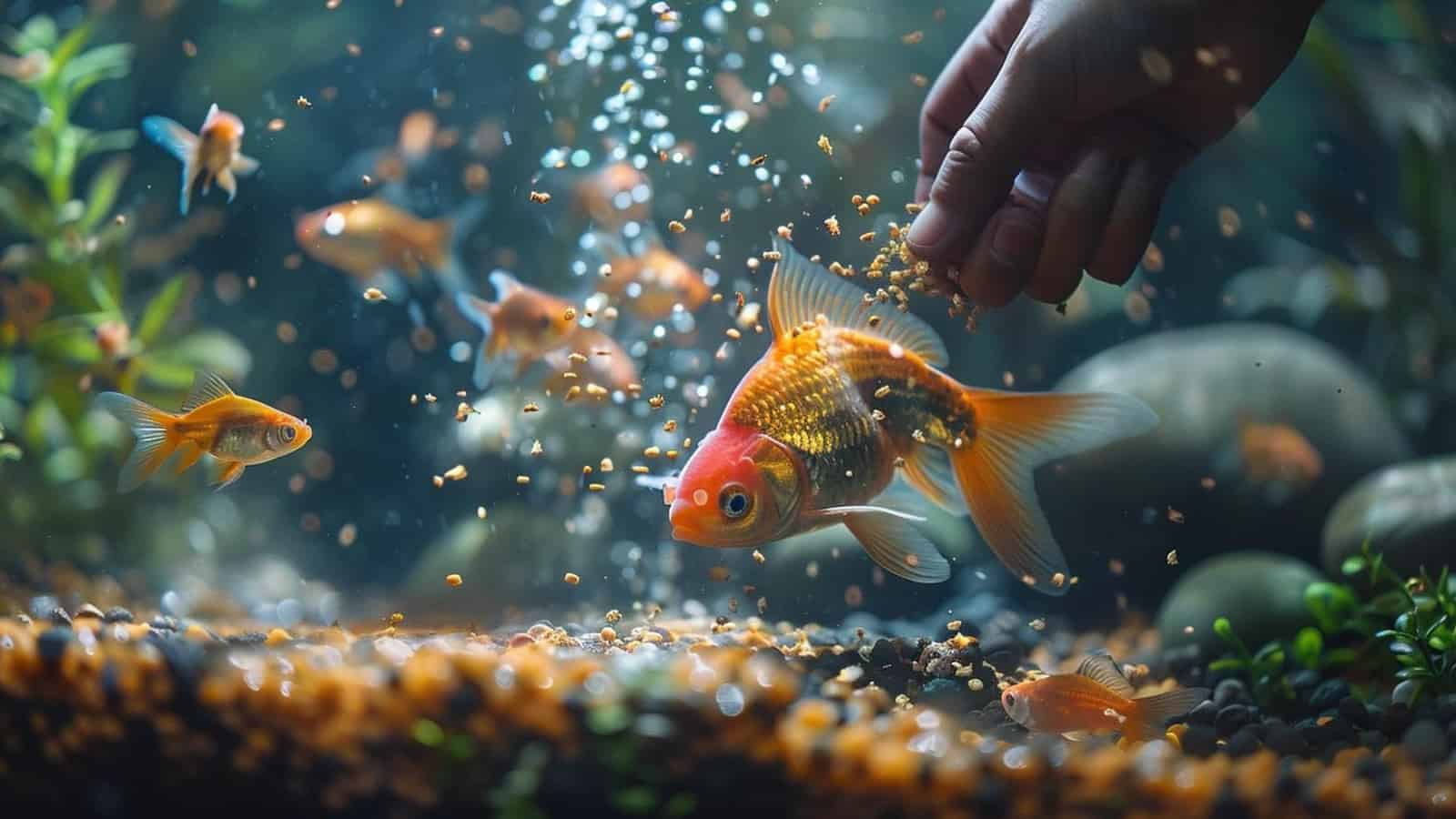
Overfeeding is another common reason for a foul-smelling fish tank, as well as being a waste of cash! When uneaten food drifts down to the substrate, it begins decomposing, encouraging bacterial colonies to grow there. As those bacteria proliferate, they release waste gasses that permeate the aquarium with a foul stench.
Most fish species only need a small amount of food every day. Omnivorous and herbivorous varieties also tend to graze on algae, helping to keep the environment tidy and supplementing their diet at the same time.
Feeding Regime
Ideally, you should feed your fish only twice daily, offering them just what they will clear up in a few minutes. Uneaten food should be removed from the tank as soon as feasibly possible with an aquarium vacuum cleaner.
It’s also a good idea to include one day per week when you don’t feed your fish anything. A fasting day allows any food that’s still in the fish’s gut to pass through before adding more to the load. That can prevent nasty health conditions like constipation, bloating, and swim bladder disorder.
Too Much of a Mouthful!
Problems can also happen if you feed your fish pellets or flakes that are too large for them to eat properly. If the food can’t make it from the fish’s mouth into its digestive tract, the fish won’t get the nutrition it needs and likely won’t thrive. Also, flakes and pellets that are too big usually get blown out of the fish’s gills, falling onto the substrate where they decay.
So, always choose food of an appropriate size for your livestock. You might need to crumble the food into fine powder to feed very small fish, like rasboras and tetras, or fish fry.
Overstocking your Tank
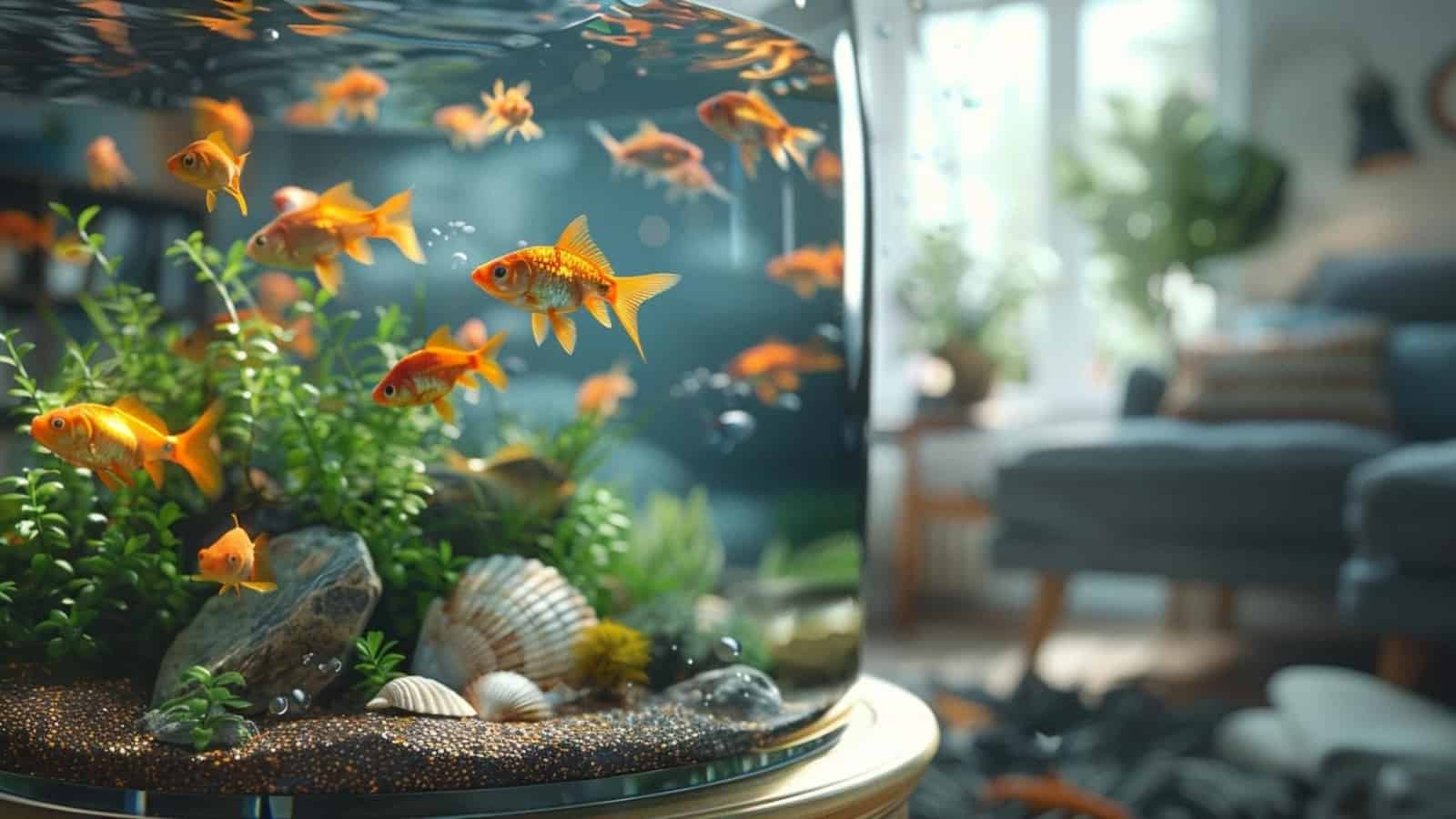
The water in your fish tank will smell bad if it’s full of fish waste, too much for your filtration system to cope with. Overstocking usually causes this.
Overstocking means you have too many fish living in a tank that doesn’t provide enough water volume. Basically, the more fish you have, the more poop they produce. Eventually, there’s too much waste for the filters and beneficial bacteria colonies to cope with.
When that happens, the water gets polluted and starts to smell horrible.
How Many Fish?
Many newbies to the hobby make the mistake of buying a bunch of fish without researching their new pets’ expected adult size. The fish keep on growing until there’s not enough room in the aquarium, and you discover you’re overstocked.
Most fish sold in fish stores or online are juveniles with lots of growing still to do, so be sure to find out how big the fish will be as adults before you take them home.
So, how much space do fish need to be happy and thrive?
As a general rule of thumb, you should allow one gallon of water per inch of fish length. However, that’s a basic guide that shouldn’t be considered set in stone. In truth, the size of the aquarium you need depends on the fish species and its usual behavior. Schooling or shoaling fish need plenty of open water swimming space to patrol; territorial types might require less swimming space, but they still need a sizeable patch to claim as theirs, while solitary fish don’t appreciate being crowded.
As well as an unpleasant smell and bad water conditions, overcrowding causes stress to the fish. Stress is a potentially serious issue in a fish tank, weakening the fish’s immune system and leaving it open to bacterial diseases and parasites.
Decomposing Plant Matter
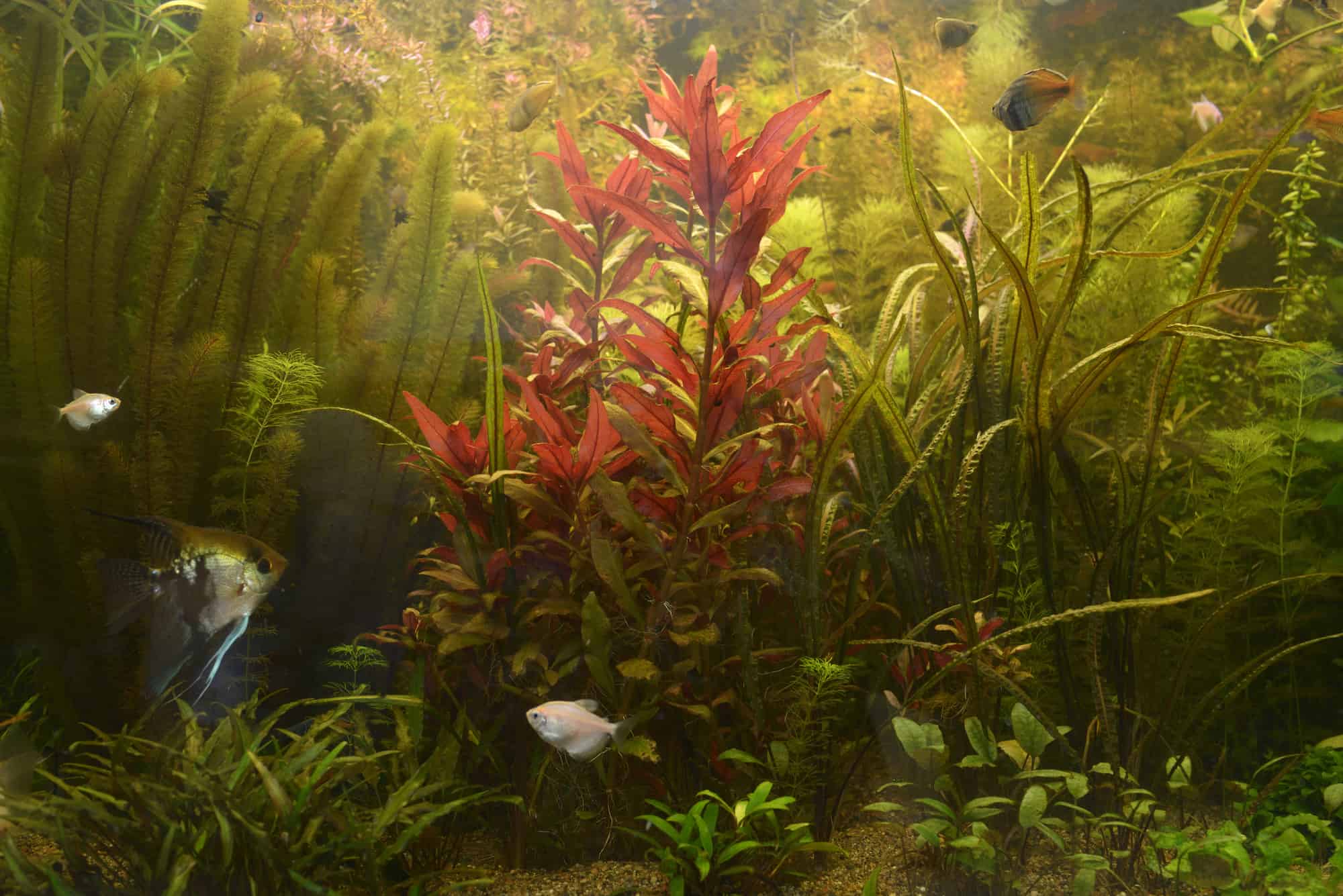
Although live plants are an excellent addition to any freshwater fish tank, they can sometimes die off and produce a terrible stench when decomposing.
Fortunately, unlike a hidden deceased fish, dead plants are easy to spot. When the foliage turns brown, black, and slimy, it’s a pretty safe bet that the plant is dead or dying. At that stage, I recommend removing the plant from your tank before it starts to rot and stink.
Regular Plant Maintenance
Even healthy plants lose their leaves from time to time as a natural process. And if you have fish that enjoy uprooting stems and tugging on leaves, damage to the plant can easily result. Dead leaves and broken stems will decay, polluting the water and creating an unpleasant odor.
Different plant species grow at different rates, but all need regular trimming and thinning to keep them healthy and in good condition. Once a week or so, inspect the plants and snip off damaged or dead leaves and broken stems with a set of aquascaping scissors. Remove fallen leaves from the substrate as soon as you spot them.
Dirty Filters
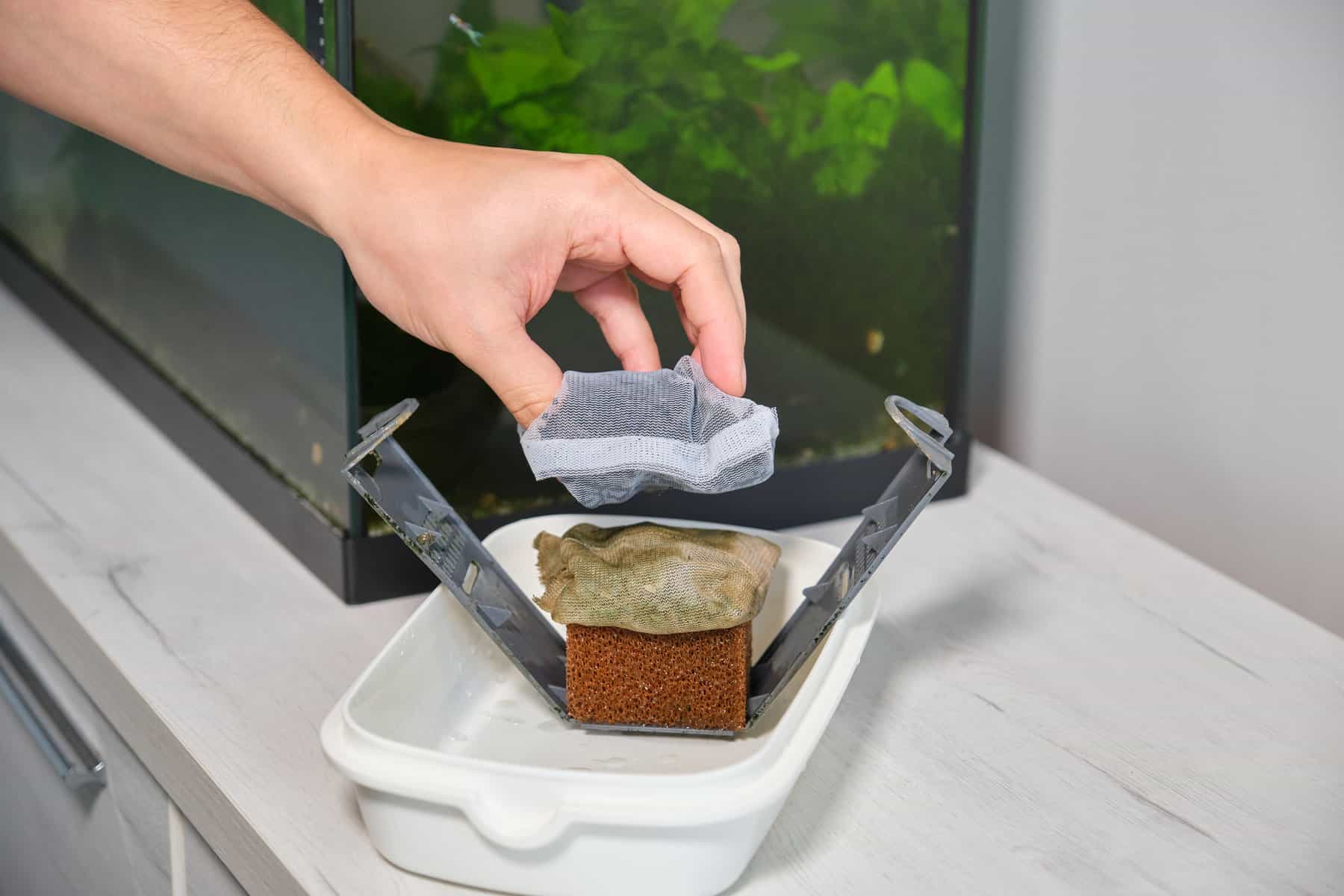
A very common cause of a smelly fish tank is poor water quality, which usually results because the filter system isn’t properly maintained.
Every fish tank needs an efficient filter system to remove waste particles from the water, process organic waste, and neutralize heavy metals.
- The mechanical filter element of the filter system captures particles of solid waste, helping to keep the water clear.
- The biological filter media provides a home for beneficial bacteria to proliferate. The bacteria feed on ammonia, turning it into nitrites and then into less harmful nitrates.
- A chemical filter removes or neutralizes heavy metals, chemical toxins, and fish medications from the water. Chemical filters are not found in every system, but I think they are a nice-to-have option, especially in areas where tap water is known to contain dangerous heavy metals like lead, cadmium, and zinc.
To keep the filter in good condition and working well, you must remove the media every couple of weeks and rinse it in tank water to remove sludge that could clog the impeller and prevent it from spinning properly. You’ll also need to replace the media periodically in line with the filter manufacturer’s guidelines.
Including activated carbon in your filter media to remove odor-causing ions (molecules). However, note that the carbon does expire eventually and must be replaced a few times annually to remain effective.
You must perform a partial water change every week or so, removing 20{a47be734f0df8d7f120a7df290cf380c79376e8356d1aab405383bb23aa6ce67} to 30{a47be734f0df8d7f120a7df290cf380c79376e8356d1aab405383bb23aa6ce67} of the tank water and replacing it with dechlorinated tap water. You’ll also need to remove algae from the tank glass, tidy your aquatic plants, and thoroughly vacuum the substrate to remove accumulations of organic water.
How To Prevent Your Aquarium From Smelling Bad
Once your aquarium is clean and sweet-smelling again, you want to keep it that way. Here are some tips on how to do that!
- Check your fish every day. If any have gone AWOL, look thoroughly in the nooks and crannies of your tank in case a dead fish is causing the smell. Once you find your dearly departed pet, remove it immediately and carry out a partial water change.
- Maintain your fish tank filtration system properly, as described above.
- Carry out partial water changes every week or so to prevent bio-waste from accumulating in the water and causing a stink.
- Don’t overfeed your fish! Feed them once or twice daily, and include one fasting day per week.
- Avoid overstocking your tank by researching the adult size of all fish before you buy them.
- Consider adding activated carbon to your filtration system to remove odor-causing ions.
- Maintain your living aquarium plants correctly by trimming away dead plants and broken stems. Remove fallen leaves from the tank before they start decomposing.
Final Thoughts
Your fish tank might still smell bad after maintenance if a dead critter lurks in there somewhere. Stinky aquariums can also be caused by poor tank maintenance, dead plant matter, and accumulations of uneaten food and fish waste.
You can prevent your tank from getting stinky by cleaning your filters regularly, not overcrowding the tank, feeding your fish correctly, and caring for your plants properly.
Follow our top tips to banish nasty niffs from your tank permanently!

